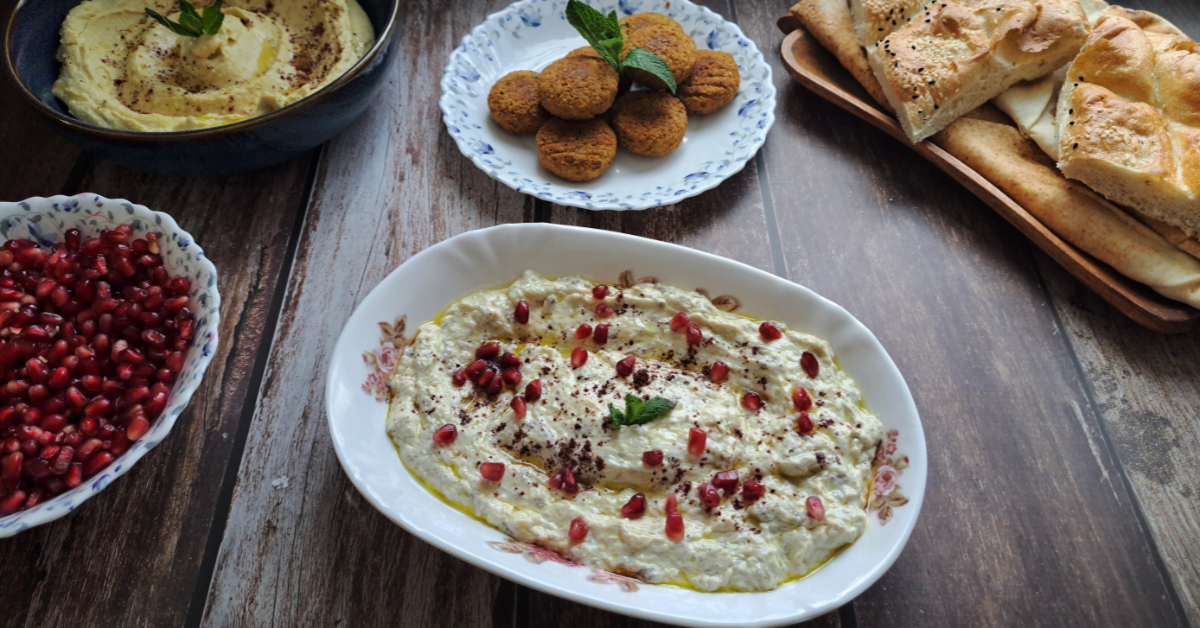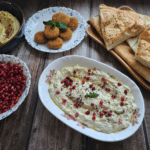Mutabal

Mutabal, also spelled as Moutabbal or Moutabbal, is popular in Middle Eastern cuisine. It’s similar to Baba Ganoush but with a unique flavour.
Aubergine, also known as eggplant, has a distinct flavour that might not appeal to everyone. I am not an exception to that. I tried this dish in a Middle Eastern restaurant and it transformed my perception of eggplant. It’s amazing how a single dish can change our entire perspective with the change of an ingredient. Sometimes, it just takes finding the right recipe or preparation method to appreciate a vegetable that you may not have enjoyed in the past. It wasn’t just a delicious dip—it was a revelation. It taught me that sometimes, the problem isn’t the taste of a vegetable itself, but rather how one prepares it.
Mutabal’s preparation process involves roasting the eggplant until it’s soft and smoky. This transforms the flavour of the vegetable, making it more tasty to those who might not usually enjoy it. The addition of ingredients like tahini, garlic, lemon juice, and olive oil further enhances the flavour, creating a delicious dip that’s rich and creamy.
Mutabal and Baba Ganoush are both popular Middle Eastern dips made primarily from roasted or grilled eggplant, but they have some differences in ingredients and flavours.
I used homemade tahini sauce for this dish. Find the recipe here.
Differences between Mutabal and Baba Ganoush.
Mutabal: The main ingredient in Mutabal is roasted or grilled eggplant. It is combined with tahini (sesame paste), garlic, lemon juice, and sometimes yoghurt. Tahini is an ingredient in this dish, giving it a creamy texture and nutty flavour. With the addition of tahini and sometimes yoghurt, Mutabal tends to be creamier and thicker in texture compared to Baba Ganoush.
Baba Ganoush: Like Mutabal, Baba Ganoush also features roasted or grilled eggplant as the primary ingredient. However, it usually does not contain tahini and yoghurt. Instead, it’s made with garlic, lemon juice, olive oil, and sometimes parsley or other herbs. Baba Ganoush has a smoother and lighter texture, relying solely on the roasted eggplant’s natural creaminess without additional thickeners like tahini.
Regional Variations
Both Mutabal and Baba Ganoush have variations across different Middle Eastern regions and individual preferences. Some recipes may include additional ingredients such as yoghurt, cumin, parsley, or pomegranate molasses.
Serving suggestions
Pita Bread: Serve Mutabal with warm, toasted pita bread. Cut the pita bread into triangles or strips for easy dipping.
With Vegetables: Offer a colourful assortment of fresh vegetables such as cucumber sticks, carrot sticks, bell pepper strips, and cherry tomatoes alongside Mutabal for a healthy and crunchy option.
Falafel: Pair Mutabal with crispy falafel balls for a satisfying combination of flavours and textures.
Mediterranean Mezze Platter: Include Mutabal as part of a larger mezze platter alongside other Middle Eastern dips like hummus, tabbouleh, and labneh. Add olives, pickled vegetables, and fresh herbs for variety.
Grilled Meats: Serve Mutabal as a condiment or dip alongside grilled meats such as kebabs or lamb chops. The creamy texture and smoky flavour of this dish complement grilled dishes.
Sandwich Spread: Use this as a spread in sandwiches or wraps. It adds creaminess to vegetarian or grilled vegetable sandwiches.
Charcuterie Board: Include Mutabal on a charcuterie or cheese board for a unique twist. Pair it with cured meats, cheeses, dried fruits, nuts, and crackers for an appetizer spread.
In summary, while Mutabal and Baba Ganoush share a similar base of roasted or grilled eggplant, they differ in ingredients, texture, and flavour, with Mutabal being creamier and richer due to the inclusion of tahini and sometimes yoghurt.
Quick tip
Ensure your eggplant is thoroughly roasted or grilled to achieve a smoky flavour. Don't forget to poke holes in the eggplant before roasting to allow steam to escape and prevent it from bursting.




Mutabal
Ingredients
- 1 large eggplant aubergine
- 2 cloves garlic minced
- 2 tbsp tahini sesame paste
- 2 tbsp lemon juice adjust to taste
- ½ – ¾ cup Greek yoghurt
- 2 tbsp olive oil plus more for drizzling
- Salt to taste
- A few drops of liquid smoke optional
- Sumac or paprika for garnish optional
- Pomegranate seeds for garnish (optional)
Instructions
- Preheat the oven to 200°C.
- Wash the eggplants and pat them dry with a paper towel.
- Cut the eggplants lengthwise into halves. Using a sharp knife, make shallow diagonal cuts (strokes) in a crisscross pattern on the flesh side of each eggplant half. Be careful not to cut through the skin.
- Sprinkle salt evenly over the scored flesh of the eggplants. This helps to draw out excess moisture and enhances flavour.
- Drizzle a few drops of liquid smoke over each eggplant half. Liquid smoke adds a smoky flavour.
- Optionally, you can also add olive oil and any herbs or spices of your choice for additional flavour. Rub the seasoning evenly over the surface of the eggplants.
- Place the seasoned eggplant halves, scored side up, on a baking sheet lined with aluminium foil and roast in the preheated oven for about 45-60 minutes, or until the eggplants are completely soft and collapsed.
- Alternatively, you can char the eggplants over an open flame on a gas stove or grill until they are soft and the skin is charred. With the fork’s tines, gently pierce the eggplant’s skin all around its surface. Make sure to space the holes evenly to allow steam to escape from various points.
- Remove the eggplants from the oven and let them cool until you can handle them comfortably. Peel off the skin and discard it. Place the flesh of the eggplants in a bowl.
- Mash the roasted eggplant flesh and keep it aside.
- In a separate bowl combine the yoghurt, lemon juice, minced garlic, olive oil, tahini, lemon juice, and salt. Adjust the seasoning with more salt or lemon juice if needed.
- Add this to the roasted eggplant flesh and combine everything well.
- Transfer the Mutabal to a serving dish. Drizzle with olive oil and garnish with pomegranate seeds if desired.
- Serve Mutabal as a dip with pita bread, Arabic flatbread, or fresh vegetables. It can also be served as part of a mezze platter alongside other Middle Eastern dishes.
Notes
Share Your Creations and Connect with Me on Social Media!
Have you tried this recipe? Don’t forget to tag me with your pictures on Instagram – I love to see your creations! 💕 Also, be sure to comment and rate below! Follow me on social media: